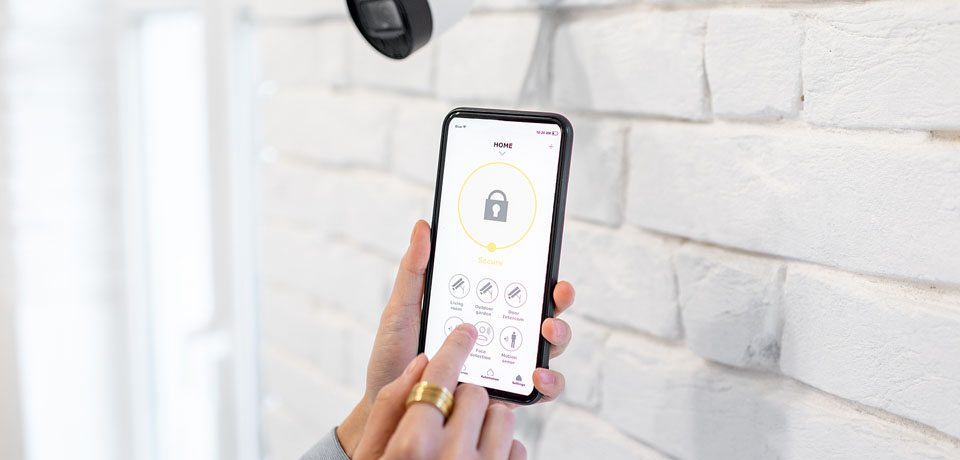
A guide to wireless security systems
With more and more staff working from home, being able to ensure that storage or workplace facilities are safe and secure while the premises are empty is becoming more challenging. Luckily there are some excellent solutions including wireless security equipment and monitoring systems.
Find out more about how they work and which might suit your needs in our guide.
Wireless technology has evolved quickly in recent years. While relatively recent, most of us are already familiar with mobile phones, Bluetooth and wireless internet connections. But the speed at which information can be transmitted via wi-fi technology is increasing rapidly. In 2010 4G was introduced allowing faster wireless connections and from 2020 5G is becoming available, speeding things up even more.
This technology, avoiding the need for wires, has resulted in fundamental changes in the way security systems operate and there are also many advantages to using wireless security systems.
Costs
Obviously costs depend on your requirements and location, but generally, wi-fi security systems can offer less expensive solutions for many property owners. While sometimes wired security systems are cheaper to buy initially, the fact that there are no wires (and no cable, no drilling of holes etc.) means that wireless systems are often less expensive to install, upgrade or relocate too. It is worth noting, however, that there are different levels of wi-fi security system which come at different costs.
Lower grade systems work well for deterring opportunist intruders or burglars, while more sophisticated systems are better suited for commercial premises or locations where high value goods are located which might attract thieves with more specialist knowledge and equipment for breaching security systems.
Do wireless security systems have ‘dead spots’?
Anyone using wi-fi internet systems will be familiar with the issue that some areas have better coverage than others, but this is not the case for wireless security systems. They actually use a different frequency of radio transmission which mean it is easier for the transmissions to pass through walls and objects while preserving battery life in the devices. Ensuring the system is professionally installed also means the devices will be located in the best possible places to ensure optimum security.
What are the main concerns with wireless security systems?
- Jamming
While wired systems can be physically interrupted, wireless jamming is a key security concern for wireless systems. However, wireless systems have come a long way in recent years and current regulations mean that wireless security systems must conform to BS EN 50131, which means they have to have in-built anti-jamming detection. In addition, a way to reduce the risk of wireless jamming is to install a two-way system which means the main control panel and the various devices in the security system have a constant and fast flowing ‘conversation’ making it far more difficult for wireless jamming to take place undetected.
- Battery life
While most wireless systems are powered from mains electricity, the wireless devices run on batteries, so another concern is that the batteries in wireless devices run low. The main control panel will notify you if this happens, but having a regular maintenance contract with a professional security system installer also means this is taken care of. It’s also advisable to have a back up battery supply for the systems in case of powercuts.
- Not the best option for large premises
Finally, for very large properties, the lower frequencies at which wireless systems work means wireless sensors can become unreliable, so it is advisable to consider a wired system for premises which extend over 400 square metres.
Advantages?
- Easy to upgrade or adapt
The fact that you can move devices such as cameras or motion sensors fairly easily.
- No cables to damage
The fact that small animals cannot gnaw through wires or cables cannot be damaged is an advantage in wireless systems.
- You don’t have to buy a new security system if you move premises
You can take your security system with you if you move premises.
- Good for rural / remote locations
They are also very useful for remote locations or outbuildings where installing a wired alarm system would be expensive and difficult.
- You can monitor security from your phone
Another important advantage at a time when many premises are unoccupied is that wireless security systems can be monitored and even controlled by smartphone, although it is recommended that you get professional security system monitoring to help reduce your own stress levels and to reduce the risk of false alarms.
- Additional remote security measures
Advanced systems offer options that can be controlled remotely such as doorbell cameras and keyless deadbolts (operated by sending signals to a small motor completely buried within the door or frame).
- Fire and carbon monoxide alarms
Smoke, flood and carbon monoxide detectors can be incorporated into a wireless alarm system.
If you’d like more information or advice on whether a wired or wireless security system is best for your requirements, we’re always happy to offer advice and help with no obligation. Call us on 01726 65636 or email security@waldons.co.uk.



